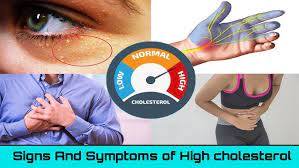High cholesterol is a significant problem for a large portion of the world. In fact, 94 million US adults over the age of 20 currently have high cholesterol.
High cholesterol is problematic because it can lead to a range of serious health issues, including stroke, angina, heart attack, coronary artery disease, and peripheral artery disease.
So, how can you determine whether you have high cholesterol? And what can you do to prevent it?
What Is High Cholesterol?
Cholesterol is a fat-like, waxy substance naturally produced by the liver. It’s not all bad. You need cholesterol for the formation of crucial substances like vitamin D, cell membranes, and even certain hormones.
Particles known as lipoproteins are responsible for carrying cholesterol through the bloodstream, and the type of lipoprotein connected to the cholesterol determines whether it’s good or bad.
Low-density lipoproteins (LDL) are known as “bad cholesterol”, as it tends to build up in the arteries and increase the risk of stroke and heart disease. High-density lipoproteins (HDL), on the other hand, are considered “good cholesterol”, as they help remove the LDL cholesterol from your system.
You have high cholesterol when your LDL cholesterol levels are higher than what’s deemed healthy by most medical professionals.
Ideally, your cholesterol should have an LDL level of less than 130, an HDL level of 60 or higher, and a total cholesterol level of less than 200. You also want your triglycerides (another form of fat in the blood) to be less than 150 mg/dl.
What Causes High Cholesterol?
High cholesterol can be caused by a range of different factors. There are certain genetic conditions which can cause higher cholesterol, called familial hypercholesterolemia. However, this is quite rare. It’s more likely that you’ll end up with high cholesterol due to your diet.
Eating foods with high levels of fat, specifically saturated fats, will increase the level of LDL cholesterol in your blood. If the LDL cholesterol levels become too high and the HDL levels are too low, the fatty deposits in your blood will build up in the vessels and arteries.
Eventually, too much cholesterol makes it difficult for blood to flow naturally through your body, causing problems for your brain and heart.
What Are The Signs of High Cholesterol?
Usually, high cholesterol doesn’t cause any symptoms until it’s already too late. In most cases, you won’t know you have high cholesterol until you end up having a heart attack or a stroke, resulting in damage to your arteries.
These events occur when high cholesterol leads to the formation of plaque, which narrows the arteries throughout your body, preventing blood from passing through naturally. Eventually, plaque can also change the structure of the lining in the arteries, leading to long term complications.
The most common signs of high cholesterol are:
- Coronary artery disease: Including angina (chest pain), fatigue, shortness of breath, jaw pain, and cold or numb sensations in the extremities.
- Stroke:Sudden loss of coordination or balance, dizziness, facial asymmetry, inability to move, slurring, or confusion, sudden severe headaches.
- Heart attack:Arteries supplying the heart with blood slowly narrow and cause a build-up of plaque, blocking blood flow to the heart.
How Do You Know If You Have High Cholesterol?
Because there are no specific symptoms of high cholesterol until it’s too late, the only way to know if your levels are too high is with a blood test. This will allow your doctor to measure your cholesterol levels and ensure you don’t have a total blood cholesterol of more than 250 mg/DL.
You should have a cholesterol test after you turn 20, then get your levels checked again every four to six years. You should have more regular cholesterol checks if you have high blood pressure, are overweight, or smoke.
If you have a number of people in your family with high cholesterol, you might also be advised to get more tests on a regular basis.
Monitoring Cholesterol Levels
The AHA recommends having your cholesterol levels checked at least every four to six years if you’re over the age of 20. However, you may need to get more frequent checks if you are at a higher risk of high cholesterol. Speaking to your doctor will determine how often you need to get checked.
Because high cholesterol doesn’t generally cause symptoms in its early stages, it’s important to manage the issue through lifestyle choices. For instance, eating a healthy diet, monitoring your health with check-ups, and exercising frequently will all help keep you in the best possible condition.



